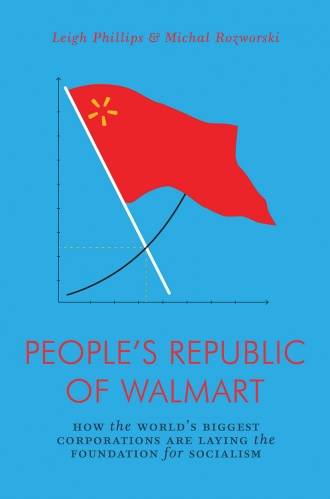This is the last article you can read this month
You can read more article this month
You can read more articles this month
Sorry your limit is up for this month
Reset on:
Please help support the Morning Star by subscribing here
People’s Republic of Walmart: How the World’s Biggest Corporations Are Laying the Foundation for Socialism
by Leigh Phillips and Michal Rozworski
(Verso, £9.99)
IGNORED both by conservatives obsessed with the “invisible hand” of the market and socialists caught up in the drama of challenging oppression, planning doesn’t elicit a passionate response.

But, as Leigh Phillips and Michal Rozworski explain in People’s Republic of Walmart, it is essential to innovation, complex projects and economic stability.
The authors do not merely rehash the notion that economic planning is useful in securing fairer distribution of goods and services — they see it as an engine for the creation of a fairer and more sustainable society.
Thus the arresting title of this book is neither paradox nor metaphor because Walmart’s quest for global retail domination may have unintended and positive consequences. Its use of a heavily centralised, technology-driven logistics strategy has proved more effective than the competitive internal market models employed by the Sears Holding Corporation.
The free-market philosophy of Hayek and Thatcher is exposed as inadequate, not just to the needs of working people but to any group operating in a modern economy. The logistics of Amazon and the Pentagon are like Walmart’s and, while the authors deplore the objectives and behaviour of these organisations, they explain that their “direct allocation” of resources, secure from the uncertainties of market forces, can provide a blueprint for democratic planning.
A series of possibilities is examined. Can production become “unfettered,” as Marx advocated, to develop smart technologies and social networks for benefit rather than profit? Can the NHS be transformed to a humanistic, bottom-up model, rather than being underfunded, dismantled and commodified? Can a rethink of global governance lead to democratic application of big data?
There is no ready-made machine to be repurposed for more democratic objectives but there is a blueprint for constructing one. The systems underpinning the “venture capital-fuelled behemoth” of Uber could enable the development of a drivers’ co-op with democratically set pay rates and co-operation with elected bodies.
This would, the authors explain, require a complete rethink of the social relations that underpin efficient but harmful corporate planning. It is mildly frustrating that no specific solutions are offered in relation to getting the right people and the control systems in place to run the system, that requires further reading in other disciplines.
The authors’ style is high energy, switching from clear, technical exposition to purple prose and street slang. There’s the odd passage necessitating heavy use of online searching — I wasn’t familiar with “edgelord,” “rustling jimmies” or “lulz.”
But the insights into the history of planning are fascinating. I knew nothing of the work of the Austrian philosopher Otto Neurath, one of several areas of further reading prompted by this provocative and lively book.








